God is Not a Man: El Shaddai
a Torah study on the word Shaddai and the Divine attribute it describes, in which I challenge the hypermasculine projections of theology—why do we need the creative force of the universe to be a man?
Hello readers, I wrote this in August of 2024, when I had begun to turn my attention and focus my faith onto studying the Torah, as the Jewish tradition teaches it. I had an uncertainty in my faith journey, still racked by the challenges of deconstruction. I came across the word Shaddai and got to thinking about the patriarchal imposition onto G-d in theology and the way it’s edged out women. Why do we need G-d to be a man? When we think and speak of the creative force of the universe, why do we impose a male identity on Her. Why not a female pronoun? G-d has no sex, G-d is. G-d contains us, we do not contain G-d. Yet, we frequently put G-d in a box. And we worship our boxed in vision of the Divine. It seems daft, doesn’t it?
I’m at a point in one of my grad school courses where we have begun talking about women in Patristic Theology. So, I thought I would dust this off and finally share it publicly. I wrote this originally as a Source Sheet in Sefaria, and I’ve copied it here to publish it in Substack. It’s lengthy because of its thoroughness and its level of detail.
If you appreciate this piece you can support my work with a paid subscription or through my tip jar, at Buy Me a Coffee. Failing that, sharing helps to support my work.
Photo: Abel Skakov, Talgar, Almaty Province, Kazakhstan via Pexels
The Nature of the Divine
Is G-d a man? Is G-d the Father? Is G-d the Son? What is G-d? Almighty Destroyer? Fearsome Paternalistic Entity? Universal Enforcer? G-d exists across matter, across place, across time.
G-d is without place or time or earthly form. We do not contain G-d. G-d contains us.
Referring to the above graphic, reading from right to left, we have Haya + Hava + Yehaya. Haya, past tense of to be (was) + Hava, to become or to exist or to breathe + Yehaya, future tense of to be. What does this tell us about the nature of G-d? It says to us She is all encompassing, past-present-future. It says to us She is the breath of life. Think of gestation. Think of G-d as the womb of the universe.
When Moses asks G-d, who shall I say I spoke to, what do I call you, G-d answers Ehyeh-Asher-Ehyeh, meaning I Am Who I Am. The overthinkers who love Hebrew double wordplay might see or hear the word Ashereh, a variant of the name of the female consort of the ancient Caananite G-d Yahweh. Look at the response: Ehyeh Asher Ehyeh, I Am Who I Am. When we remove Asher, we simply have Ehyeh Ehyeh, I Am I Am. Without the relational word, Asher, G-d's response to Moses consists of two separate and unconnected iterations of being.
Think about what links the past to the present to the future. Women do. Motherhood does. Maternal creative energy provides the thread that binds humanity together in a composite legacy we call history and heritage. Who are you? Son or daughter, father or mother, sister or brother. Our connections to one another define us to a large extent. Our family attachment connections provide the foundation for our being, like a cornerstone does for a physical building.
Yud-Hey-Vav-Hey has many attributes and several names. As a matter of convention we refer to the Divine in the masculine he/him/father/bridegroom. My Catholic upbringing taught me about the Divine as a distant paternal figure who had lots of rules for us to follow and did this really weird horrific thing (See the Jesus Christ story) to supposedly save me and my fellow hoomans from our inherently bad nature, called Original Sin. Why? Why is G-d a father and a son? I don't understand how a father represents the ultimate in universal compassion and love when we all entered life through a mother whose body made us with Love, and whom we split wide open in seeking life, even long after birth.
A child competes for her father's love, and exists because her of mother's love.
My father responded to news of my impending birth with distress, I had to win his love and I did, though adolescence and then motherhood created a gulf between us that we never entirely could bridge. In contrast, my mother has never felt distant from me, not by developmental achievement, nor geographic separation, and not even by death. My mother has shown me the Divine by just being a mother of 6 children and facing the competing and sometimes hellish demands of motherhood + womanhood + wifehood.
Why Not G-d the Mother?
A mother loves her child into existence. A father loves his child because it exists. How can the Divine be Our Father when we exist because the Creator loved us into existence?
G=d made each one of us—Divine love breathed us into creation. We each have an individual uniqueness and a universal connection to the source of life. G-d is limitless compassion for us as individuals and a whole. Imagine a beloved matriarch of a large family in relationship connection with her children. Abrahamic religions each have sufficient primary source Biblical texts to corroborate this description of a Compassionate Creator who loves unfathomably and unconditionally. For example, the opening word of the Quran is Bismillah, to denote a most Compassionate and Merciful G-d.
Despite all the evidence of a maternal + feminine, sustainable + sustainer, fierce + forgiving Divine Creator, we live in this world where G-d is a man, a father figure + a paternal entity far removed from us. G-d is not a man. G-d is not my father. G-d is my life-source and a boundless hidden mercy. In her Source Sheet Women of the Bible: Female Body Images in the Bible, Elizabeth Goldstein provides several Biblical examples of female imagery describing the Divine, including as a mother eagle, as a mother bear, as a human mother, as a nursing mother, and as a birthing mother.
In his commentary, Rashi writes about this passage in Deuteronomy IT HOVERETH OVER ITS YOUNG — it does not press heavily upon them, but hovers above them — touching them and yet not touching them. Rabbi Bahya writes in his commentary, Just as the eagle takes its young, carrying them on top of its wings, guiding them to various places, so G’d alone, guides the Jewish people (in the desert) ... did not employ the help or assistance of any other deity. In Siftei Chakhamim Shabbetai ben Joseph Bass comments on the Divine attribute of Shaddai, noting that, in maternal fashion, G-d does not act upon creation with the full power of Divine strength.
Mothers have hidden and unseen influence on their children, they induce changes in behaviour without direct physical action or even any physical contact or sound. We all know the look that mama gives us and we know what it means and we know what to do without a word. Sometimes our conscience adopts the voice of our mother. As mentioned in the excerpt from Isaiah 49 below, a mother cannot easily deny her progeny and distance herself from her responsibility to them. We must remember that mum loved us into existence by giving birth to us and, even if she didn’t stick around to finish the job she started, the Divine never forgets us. I think G-d is like maternal love. I see and feel and think of the hidden power and might of Shaddai like this.
El/Shaddai
El/Shaddai appears in the Torah in a context of blessing the patriarchs to seed flourishing nations of humanity who spread far and wide universal Compassion of the Divine through the teaching of the Torah. Shaddai has a consistent association in the Torah with the family unit as the foundation and building block of a viable human society. Shaddai conveys the hidden might of G-d through themes of fertility, mercy, nurturing. It conveys seeing the Divine attribute of Compassion as sufficient to enable us to rise above the wounds of condemnation and vengeance. Shaddai sustains and, because of its enoughness, proves an unstoppable force. Think unstoppable like a mother's mercy, think unstoppable like childbirth. Remember mothers are the most fearsome and fierce creatures in the animal kingdom, human mothers will be no different than this in our connection to our children and our social world.
Sixteen years ago in her blog Rabbi Jill Hausman wrote about the feminine image of G-d.
"The name El Shaddai is sometimes translated as God Almighty, but it really means something quite different. El means God but Shaddai comes from the word, Dai, as in Dayenu. It means enough or sufficient. El Shaddai means God who provides sufficiently for us: in other words, God the nurturer. This role of nurturer or provider is further reinforced by another meaning of Shaddai: from the word Shadayim, or breasts. God is the Mother who feeds us, takes care of us, and provides for all our needs.
If this is so, why, we might ask, does the Torah have such a patriarchal feel, and so many masculine pronouns for God. Our confusion comes from our need to read the Torah literally, and this can be a big mistake ... We are male and female: God is not. We have arms and legs, and eyes and ears: God does not. When the Torah says, God-He: it is no more a reference to God being male than when it says, “If I have found favor in your eyes,” being a proof that God has eyes. These are metaphors. The former is a sign of respect. The latter is simply a manner of conveying an idea. We know this; our Torah commentators, such as Maimonides and Rashi emphasize it, but we forget.
We should not be particularly surprised either, by the preponderance of male names in the Torah if we can remember the society of the time the Torah was written down ... many passages have been interpreted to the disadvantage of women in the past, but in many instances, a pro-feminine interpretation is also supported by the text."
Rabbi Allen S. Maller describes El Shaddai as the maiden name of G-d, the name humanity used for G-d before Her covenant with the children of Israel in the Sinai Desert. El Shaddai appears 6 times in the Torah and Shaddai appears 9 times. Rabbi Maller writes, "El Shaddai is a feminine image because a mother gives unearned love naturally. “The Torah of kindness is on her tongue.” (Proverbs 31:26) Adonai is a masculine image because the Book of the Covenant is filled with Mitsvot. (Exodus 20:1-24:12) We have long tilted toward the strict rule of law. We should be more in the middle as scripture says, “Lodge between my breasts.” (Song of Songs 1:13)."
Etymological Discussion
Shaddai is a Divine attribute in the Torah
Shad — singular Hebrew for breast
Shadah — Hebrew for irrigate
Shaddaym — plural Hebrew for breasts
Thadi — singular Arabic for breast
Sadr — Arabic for bosom-thorax-breastplate (double meaning for refuge/breasts)
Sattara is a Divine attribute in the Islamic tradition meaning to Veil or Protect (Refuge)
Shdi — Egyptian for suckle
Chadiy — Aramaic for breast
Serretu — Akkadian for teat/nipple
Shaddu— Akkadian for mountain
Shawdi — Old Akkadian for breast
Sha — Akkadian for heart
Several competing theories vy for legitimacy when it comes to the origin of Shaddai. The evolution of this scholarly discussion about the etymology of Shaddai reflects external perceptions of Judaism, in particular the Oral Torah. It also mirrors the evolution of the feminine in society. Interestingly, recent archeological discoveries at Kuntillet Ajrud point to ancient deities that predate monotheism, including a male deity with a female consort and also an assortment of fertility goddesses. An interesting Canaanite female goddess named Anath occupies an ambiguous position, as a goddess of war and also fertility. "... A maiden/warrior goddess, the sister or consort of the fertility and storm god Baal, she plays a major role in the Ugaritic myths, rescuing Baal from the underworld and defeating Mot, the god of death." Does this remind readers of any other popular religious prophetic deity figure? I immediately thought of Jesus when I read about Anath. In his paper The G-d with Breasts, Biale cynically observes the psychological and theological utility of ... the transformation of the "god of breasts" into the "almighty god of war" when he asks, what better way to suppress one interpretation of a god than by substituting its opposite?
Theories of Shaddai: Brief History
In 1908 de Jassy proposed that Shaddai meant Almighty based on the word Shadad, which means destruction, and the Akkadian word Shadu, which means mountain. In 1915 Behymer challenged this theory, and made a case for the breast theory. In response to O. N. de Jassy, who suggested an etymological link between the Hebrew name El Shaddai and the Sanskrit language, Behymer offered a vision of God the Nurturer, based on the Torah itself and Semitic language etymology. In 1935 Albright proposed the mountain theory, noting that the double consonant of Shaddai harkens to shadda'u, mountainer. Various scholars developed and built on Albright's theory and in 1961 Weippert proposed that a G-d of the plains seemed more likely than a G-d of the mountains. In 1982 Biale wrote, It is a methodological mistake to assume that the biblical authors knew as much about Near Eastern cultures and languages as do modern philologians. Systematic, ie Torah -centric, analyses corroborate the breast theory of Shaddai's etymology.
Although widely accepted within Hebrew scholarship, the breast theory does meet resistance from those entrenched in a patriarchal conception of G-d. The breast theory also meets resistance from non Hebrew scholars, in particular Trinitarians and those from Trinitarian cultures. A failure to engage the Torah in crafting etymological arguments about the words that appear in the Torah means that much of the analysis suffers from intellectual weakness and a dearth of scholarly rigour. In addition, the notion of a Divine with powerful feminine side does offend the mainstream as somewhat heretical. Throughout my research on the origins of Shaddai, I noticed a pattern of repeatedly equating Divine strength with direct physical force, with masculine energy and might. Scholars and thinkers repeatedly fail to apply the primal understanding of maternal might and the human condition to their analyses about the nature G-d, in whose image we were made, according to Genesis 1:26-7.
Textual References
Shaddai appears a total of 9 times in the Torah. It appears elsewhere in the Tanakh, for instance the book of Job contains 30 references to Shaddai, and, in this study, I will only address the Torah references.
We first see El Shaddai in the Torah in Genesis 17:1. Ibn Ezra's commentary on Shaddai focussed on the quality of might as a masculine force of power, he views this passage through a masculine lens and provides a disagreeable analysis. His commentary does not jive with the spirit of the text, it does not bring the text to life. Looking a bit further ahead, at 17:3, we see, confirmed by Chizkuni, that Abraham prostrated himself in gratitude and humility and joy.
The Hebrew words walk + before + be + complete in English would translate walk before me and be whole, the phrase conveys a Divine attribute of parental Compassion — mother wants her young children to walk before her, where she can keep watch over them, and ensure they remain wholly safe from predators. In their interpretation of walk before me and be whole Rabbi Fohrman and his Aleph Beta team invoked the oft-used shepherd metaphor, still a vision of the Divine that remains within the realm of a hypermasculine monotheistic deity. What if, using the language of shaddai, the Torah wants to help us understand the hidden nature of Divine Compassion through our primal connection to maternal Compassion?
In Genesis 28:3, Jacob has to flee his brother’s violent threats and so his father sends him on his way with a blessing. Isaac blesses his son Jacob through the Divine attribute of Shaddai and wishes for an assembly of nations to form from his descendants. Jacob follows his father’s advice and makes his journey, on the way he stops at Luz and dreams about a ladder and a Divine promise to father a great nation.
In his rabbinical text Akeidat Yitzhak Isaac ben Moses Arama writes Sometimes, the very willingness to subordinate one's mind makes that mind receptive to matters undreamed of. Jacob is an example of such an attitude. After his dream, he was able to exclaim, "Indeed the Lord is in this place, although such a thought had been furthest from my mind" (Genesis 28,16 approx). Bereshit Rabbah 68 describes the sun having set not at its natural time so that G-d could talk to Jacob. Reading the English translation without the rabbinical commentary, without knowledge of the original Hebrew text, one would miss the clue: לְהַלִּין lehalin. Lehalin means to lodge, so the passage tells us that Jacob had to make lodging as though nightfall because the sun had set at a time when it normally did not set. This is analogous to a king’s friend who would come to him on occasion. The king said: ‘Extinguish the lamps, extinguish the lanterns, as I wish to speak with my friend privately.’ So, the Holy One blessed be He caused the orb of the sun to set not at its proper time, in order to speak with Jacob privately.
Jacob names this place Bethel, meaning dwelling place of G-d.
Note the maternal quality of G-d's love. An infant needs do nothing or exert any power or to help her mother nurture her. She cries in distress and mother answers. Mother often meets a need before the child even expresses it. Similarly G-d needs no assistance from us, he needs nothing from us at all, it is we, the children, we need to need G-d, like we did out mothers as infants and children. What does this tell us about Compassion in the Torah? Can you see a picture of Compassion forming through the examination of Shaddai?
There’s the uncomfortable tension regarding the sibling rivalry between Jacob and Esau and Isaac’s role in it. That’s also Compassion. The very hooman stories of sibling rivalry and parental struggle in Genesis are the part where we need to remember and understand mysterious hidden mercies of the Divine that baffle as much as maternal mercy does. According to the midrash, Jacob has purchased his older brother Esau’s birth right for a bowl of lentil soup following a session of Esau’s debauchery and murder. Read: Esau was not a good man. Did Jacob really trick his father? That’s not a 100% certitude, in my view. The midrash also describes the way Issac could smell the scent of Eden on Jacob and the scent of Gehenna on Esau. Consequentiality and consistency make Divine Compassion freeing and not punishing.
In his commentary on Genesis 28:3 Chizkuni writes ואל שדי, “and the G-d known also as Shaddai;” the G-d Who has said of Herself that none of His creatures needs any other power to help him. So far the attribute Shaddai tells us about a G-d who nurtures in an almighty nature :: She needs no help from us. She provides for us, who do nothing at all for Her. She gives the breath of life, which finds a way, nothing can stop it, Shaddai reminds me of giving birth. Have you seen anything mightier than a life entering the world through the birthing process? A powerful creative force conveys the energy of opportunity, of transformation, of cultivating and building :: Shaddai.
In Genesis 35:11, G-d appears to Jacob in a dream and renames him Israel, after he had spent a night wrestling with Esau's guardian angel. Jacob has asked his household and followers to give up their foreign gods and follow him to Luz/Bethel to build an alter to the One G-d. G-d makes a covenant with Jacob at Luz, which becomes Beit El, house of G-d, and gives him the land of Caaanan.
Sforno's commentary reminds us that G-d speaks to Her prophets through the Divine attribute of Shaddai. Her essence יהוה (YHWH in Latin letters) burns so brightly that we cannot endure Her visage, in Numbers G-d tells Moshe that no soul can look upon Her face and remain in its physical body, and so with the exception of Her trusted servant Moshe, G-d appears to Her prophets indirectly.
We do not connect with Shaddai wholeheartedly, we connect with Shaddai to have a whole heart. In this way we continue the Creation which G-d began and then stopped after 6 days. The Torah uses Shaddai to tell the stories of the founders of the Jewish nation of people, G-d opens wombs and blesses the barren with children, gives life to the childless so they can live on through the legacy they leave their children. What if Shaddai is the might of creation, of life finding a way?
In Genesis 43:14 Jacob and sons face famine in Canaan, Jacob believes Joseph to be dead since many years. His sons, who, badly bullied their younger brother out of jealousy, had thrown Joseph into a pit and sold him to the Egyptians as a slave. Joseph survived unbeknownst to his family and rose to high ranks in Egyptian society. Judah + Rueben and the others have gone to Egypt to buy food from a mysterious high ranking man whom they do not know is their lost brother Joseph, and who has recognised his brothers. Simeon gets arrested and imprisoned for being a spy.
Joseph wants the brothers to bring Benjamin or he will stop supplying them food. Judah + Reuben go to Jacob to ask him to give his only remaining son from the late beloved Rachel. Jacob speaks to his sons, remembering the promise G-d made to him years earlier (see above Genesis 35:11). In a scene reminiscent of The Akeida, Jacob thinks he is handing over his remaining favourite son to the Egyptians to survive the famine. He trusts G-d even though he is shakol do so, to hand over his beloved son. Jacob invokes the Divine form known as El Shaddai to bless the man, who happens to be Joseph. According to The Rambam, this verse ... contains a great mystic thought. Jacob was saying to his son that G-d “…should direct [us] upward from the Divine attribute of justice to that of compassion.”
Rashi writes, “G-d who gives plenteous mercy and in whose hand is sufficient power to give — may He give you mercy. This is the real meaning of the words. A Midrashic explanation is: He who said to the Universe, “Enough!”, may He say “Enough!” to my troubles. I have had no rest since my youth — trouble through Laban, trouble through Esau, the trouble of Rachel, the trouble of Dinah, the trouble of Joseph, the trouble of Simeon, the trouble of Benjamin” (Genesis Rabbah 92:1). In essence, in a kind of despair, having endured a series of sorrows and life trials as written in Daak Zeknim Jacob says to his sons, enough, may it be enough for G-d, Shaddai. Rebbe Nachman of Breslov commented that when we despair because we think we have broken something beyond repair, believe that the thing that we broke we can also mend. A child says mama, it hurts, I need you to see this hurt so it can heal, believing their mother’s attention and care a healing force — El Shaddai invokes that connection with the Divine.
In Rabbeinu Bahya Bereshit 43:14 Rabbi Bachya ben Asher writes, “Our sages in Berachot 64 interpret Psalms 20,2: “May the Lord answer you in time of trouble, the name of Yaakov’s G’d keep you safe;” as a reference to this attribute Shaddai. This was the reason that David mentioned only the G’d of Yaakov in that hymn and not that of Avraham and Yitzchak. We learn from here that one should always get hold of the thickest part of a beam when trying to move it.” The reference to Jacob’s G-d reminds is that there was no righteous person that encountered as many troubles as Jacob, and Shaddai always provided. The G-d of Jacob refers to Shaddai, Divine Mother who commits to Her children and never waivers in that commitment.
In Genesis 48:3, now a very old and sickly patriarch, Jacob recalls the events of Genesis 28:3 to his son Joseph, who has brought his own two sons. He blessed me, Jacobs says, recalling Bethel and G-d's promises fulfilled, from his deathbed. Jacob gives his blessings to Joseph and Joseph's two sons, and Jacob provides instructions for his own burial, begging that Joseph not leave his bones in Egypt, but rather carry them to Caanan.
In Akeidat Yitzak 25:1 Rabbi ben Moses Arama writes, “A man of renowned moral stature can transmit to others some of the qualities he has acquired. Whereas physical powers have a tendency to decline with advancing age, spiritual powers are enhanced by the onset of old age. As a result of this phenomenon, blessings and prayers for others are usually reserved till near life's end, since at that point the person bestowing them is at his spiritually most potent.”
Jacob’s blessing reminds and instructs Joseph and present day society that the way to service of G-d lies in staying on the path of the just, service through family life. Jacob served G-d by first believing, and second by having patience and faith, and third, by building a nation of humanity. We best serve universal goodness when we feed humanity by caring for it, ie through thoughtful parenting, grand parenting, teaching, mentoring, leading, providing. Providing denotes providing care, ie. parent.
In Genesis 49:25, Jacob gives his final blessings to his sons from his deathbed. In the previous line, Jacob speaks of future Joseph receiving blessings for not holding hatred in his heart against his brothers. From Sefer HaYashar, “and thou Joseph, my son, I pray thee to forgive the sins and transgressions of thy brothers in the evil that they have done unto thee, for the Lord hath ordained it for thy good, and the good of thy children.” Shaddai provides deep and sustaining and abiding and foundational blessings—when the womb flourishes with life, when the earth flourishes with Compassion, the breasts swell and become engorged with milk, the heavens will flow with blessings to sustain the earth.
In a similar vein, the Targum Jonathan notes, “From the Word of the Lord shall be thy help; and He who is called the All--Sufficient shall bless thee with the blessings which descend with the dew of heaven from above, and with the good blessing of the fountains of the deep which ascend and clothe the herbage from beneath. The breasts are blessed at which thou wast suckled, and the womb in which thou didst lie.” Here we have the intimate connection between inner founts of life, the womb of the earth and the breast of the heavens—both work in tandem and mysterious balance to produce rain, and then grow flora, which support fauna and provides material for humans to build homes for themselves, where they can raise their children and grow their families and lives.
In Exodus 6:3 the Divine name El Shaddai makes a final appearance, in reference to G-d communicating prophesies to His prophets through their dream state. Ibn Ezra, still looking at El Shaddai as describing masculine might, cannot make sense of the meaning in Exodus 6:3. Let's return to Chizkuni's commentary on Shaddai :: that שדי, refers to the G-d whose promises are meaningful because He is able to fulfill them and no one can stop Him from doing so. Do you see what Ibn Ezra could not, when you review the El Shaddai citations above? Maybe a look at the text will make clear to you what Rabbinic commentary seems to have missed.
What do Abraham, Issac and Jacob have in common? They each received their name through the Divine attribute of Shaddai. They each gave birth to a new form of themselves through their faith in and connection to G-d. Avram became Avraham, transforming himself from father of might to father of compassion. Remember, raham means womb and it means compassion—both. Compassion means behaving in a womb-like manner. Jacob became Israel, transforming himself from supplanter to one who prevails with G-d. Isaac received his name from G-d through Avraham and was spared by G-d at The Akedah, thus ending child sacrifice.
In his 13th century text on the Kabbalistic 300 names of G-d, Sha'arei Orah, Third and Fourth Gates, Seventh and Eight Sefirah 52, Joseph Gikatilla writes, “in contrast, our teacher Moshe, peace be upon him, entered the Tent of Meeting-Ohel Mo’ed-אהל מועד, and spoke with HaShem-יהו״ה face to face, this being “the polished lens-Aspaklariya Metzuchtzachat-אספקלריא מצוחצחת.” However, all the other prophets spoke with HaShem-יהו״ה through His title Lord-Adona”y-אדנ״י, which is the “unpolished lens-Aspaklariya She’Eina Metzuchtzachat-אספקלריא שאינה מצוחצחת.” This is the secret of the verse ..."
In Numbers 24:4, we find ourselves drop-chuted right in the middle of a story about a secular prophet for hire Bil'am, hired by the Moab King Balak to curse the Jews. In Chapter 22:22 Bil'am the secular prophet or sorcerer for hire, has an argument with his talking donkey, who sees the angel G-d has sent to block their path. Bil'am, whom G-d previously warned not to curse the Jews, finds he cannot curse the children of Israel. Rather he can only bestow blessings upon then, through the voice of Shaddai. A donkey foils Bil'am and Bilak's plan to curse the Jews and bring them to hardship or ruin, meaning a simplest of creatures, one not even deemed pure enough for an offering to G-d, can receive the Word of G-d.
The Torah teaches us by reinforcing lessons through double meaning, and here we can see the throwback to Abraham, in Genesis 17:1, when G-d spoke I am El Shaddai walk before me and be complete, after which Abraham fell נֹפֵ֖ל onto His face, in 17:3. The phrase but with eyes unveiled tells us that Bila'm has heard and known G-d.
Targum Onkelos Numbers 24: 4 interprets this passage, this is the declaration of one who hears [from before] God's utterance, who sees the vision of [from before] the Almighty; fallen, with opened eyes [it is apparent to him]. In this passage Shaddai denotes G-d as Provider, the ultimate Compassionate parent who will go to the lengths of bestowing the grace of His vision upon his most wretched and powerfully misguided prophets, Bal'am, in order to protect his children, B'nei Yisrael.
What if Shaddai wants to show us a G-d of might through great restraint borne from unimaginable Compassion? In retrospect the most mighty things I have seen each my parents do was exercise the greatest restraint at times of great hardship and chaos. What if the mightiest might we never can see because choosing Mercy often means choosing Not To do the thing?
Numbers 24:16 the story of Bilak and Bil'am continues, as Bil'am has told Bilak that he cannot cross the Word of יהוה (YHWH), and that he can't do this Prophet for Hire scam thing anymore so he's going home to his people and before he leaves he will tell Bilak what future he saw in his vision from G-d. The word fallen נֹפֵ֖ל appears again, in fact the entire phrase fallen with eyes unveiled reappears.
Targum Jerusalem Numbers 24: 4 writes, the man speaketh who heard the Word from before the Lord, and learned knowledge from the Most High; who saw the vision in the presence of the Almighty, seeking prostrate on his face, when the visions of prophecy were disclosed to him, and he was made to foreknow of himself that he will fall by the sword, but that his prophecy will be confirmed. Note the complement to Abraham — can you see the oppositional contrast between Abraham and Bil'am? Since the Torah teaches us through contrasts of characters and double meanings, maybe there's a bit of contrast to Moshe in that Bil'am saved the Jewish people and himself did not make it to his future, having foreseen his own death by sword in his vision from G-d?
WHAT DOES IT ALL MEAN?
G-d is. G-d simply is, without place, without time, without space, without matter, without gender or reproductive class. G-d describes Herself as I Am Who Am. The choice of monotheists to use a masculine pronoun and declare alternatives blasphemous reflects a certain devaluation of the feminine and a peculiar homoerotic patriarchal vision of humanity.
Based on the definition G-d gives us Herself, we, made in the image of the Divine, are a composite of past and present realities and future possibilities. Hoomans lack the capacity to destroy what G-d made into reality, we can only displace and shift suffering. We lack to capacity to destroy suffering, we definitely cannot destroy suffering with more suffering. Through the Torah we possess overwhelming evidence of a Divine with powerful feminine attributes. So why do we cling to this image of a hyper-masculine deity who takes booty as He pleases, sewing his seed where He will, and who throws lighting bolts at His kids whenever they pissed Him off?
May the Name of the G-d of Jacob shield you, Psalm 20 says. The Psalmist, David, mentions the G-d of Jacob, in particular. Why? El Shaddai, through Jacob, taught us to build a nation of humanity, using the family unit as a building block. Shaddai led Jacob and Joseph and Rachel through unspeakable personal obstacles and familial hardship, their stories are indeed a legacy for all, because they show us the human condition and provide us a glimpse of the everyday path of the just.
The G-d of Jacob showed us the complex interconnectivity of life: the womb of the earth flourishes and the breasts of heaven swell up, the two work in tandem to help humans grow their food, and supplies to build their homes and care for their families and build a world. The G-d of Jacob shows us the strength of restraint and the might of unseen forces, such as mercy, such as humility, such as choosing to resist vengeance, such as trusting, such as hope.
It all begins with Shaddai, Ehyeh Asher Ehyeh. It begins with hidden connections. It begins with seeking, in earnest.
Ehyeh Asher Ehyeh, I am who am tells us that, when we wreck societies through violence, we create layers of suffering. We can eliminate nothing, only transform. So, we aren't we really eliminating terrorism through war, are we? No, we are creating homelessness, poverty, disease, profound traumatic stress, family rupture, all the social ill that come from massive human displacement. Through yesterday's choices we make today's reality and through today's choices we make tomorrow's reality. We choose and create a reality, we do so within the confines of the Universal Design. Like Skyrim or Fallout, we are bound by programming limits. When we play Fallout and make a choice and face a series of cascading consequences related to that choice, do we blame Tim Cain, game designer? Likely not.
G-d is a verb: divinity is a connection to our existence.
Questions for Reflection and Further Exploration
Have we erased the feminine attributes and nature of the Divine?
Have chauvinists hijacked G-d and turned the Divine into a homoerotic destroyer with paternalistic leanings?
Have we hyper masculinised the religious experience?
What does our understanding of the Divine tell us about ourselves?
What can our portrayal of the Divine tell us about our relationship to the feminine?
What does our portrayal of the Divine tell us our valuation of and respect for women, generally?
Did patriarchal monotheists repackage and fuse female deities into a single male deity in their effort to suppress the feminine Divine?
What if many pressing present day sociopolitical realities invite us to divorce chauvinism from worship of G-d? How long will our mainstream religious discourse continue to deny the connection between our hyper-masculine vision of G-d and the societal ills we face?
References
Albright, W. F. (1935). The Names Shaddai and Abram. Journal of Biblical Literature, 54(4), 173–204. https://doi.org/10.2307/3259784
Behymer, F. M. (1915). On The Origin Of The Hebrew Deity-Name El shaddai. TheMonist, 25(2), 269–275. http://www.jstor.org/stable/27900533
Biale, D. (1982). The God with Breasts: El Shaddai in the Bible. History of Religions, 21(3), 240–256. http://www.jstor.org/stable/1062160
Cronin, KJ. 2022. THE NAME OF GOD AS REVEALED IN EXODUS 3:14 An explanation of its meaning. Exodus 3:14. Accessed August 11, 2024.
Carepenter, Melissa. (2017). Shoftim: No Goddesses Allowed. Questioning Torah, August 24, 2017. https://mtorah.com/tag/asherah/
de Jassy, O. N. (1908). THE MYTHOLOGICAL HEBREW TERMS EXPLAINED BY THE SANSKRIT. The Monist, 18(1), 126–142. http://www.jstor.org/stable/27900090
Krogevoll, Aleksander. (2017). "I Appeared as El Shaddai: Exploring the Mountain Motif as an Element for the Equation Between Yahweh and El Shaddai." A Doctoral Thesis submitted to the Faculty of the University of St. Michael’s College and the Graduate Centre for Theological Studies of the Toronto School of Theology. University of St. Michael’s College and the University of Toronto.
LaRocca-Pitts, Beth. "Anath: Bible." Shalvi/Hyman Encyclopedia of Jewish Women. 27 February 2009. Jewish Women's Archive. (Viewed on August 8, 2024) .
Lutzky, H. (1998). Shadday as a Goddess Epithet. Vetus Testamentum, 48(1), 15–36. http://www.jstor.org/stable/1585459
Maller, Allen S. (2019). El Shaddai: God’s maiden name. Times of Israel Blogs. February 7, 2019.
Neumann, M. (2016). (El) Šadday–A Plea for an Egyptian Derivation of the God and Its Name. Die Welt Des Orients, 46(2), 244–263.
Strong's Exhaustive Concordance of the Bible. (n.d). 834 asher: who, which, that. In Bible Hub.com. Retrieved August 11, 2024, from https://biblehub.com/hebrew/834.htm
Zvielli, A. (2012). Mystery in the desert. Jerusalem Post, October 18, 2012. https://www.jpost.com/magazine/books/mystery-in-the-desert




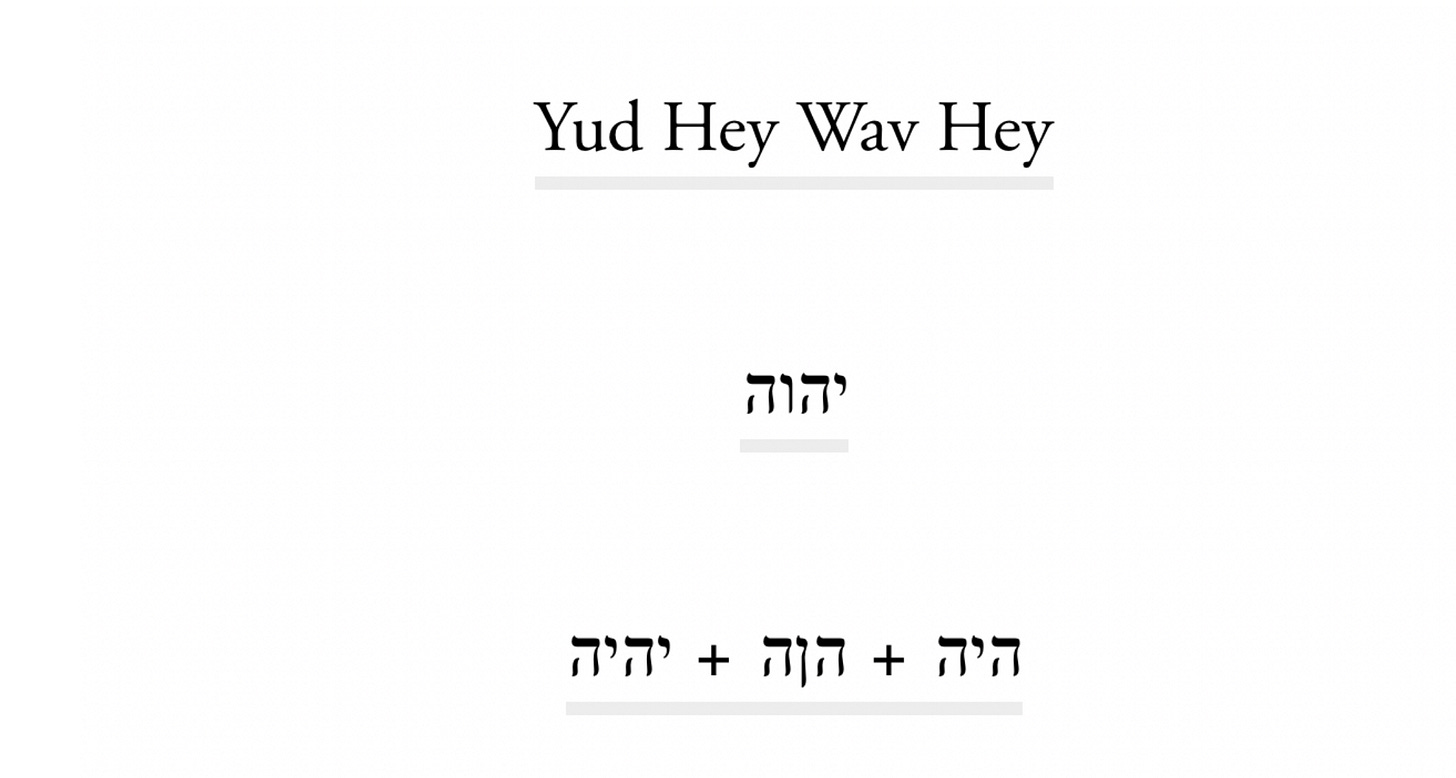
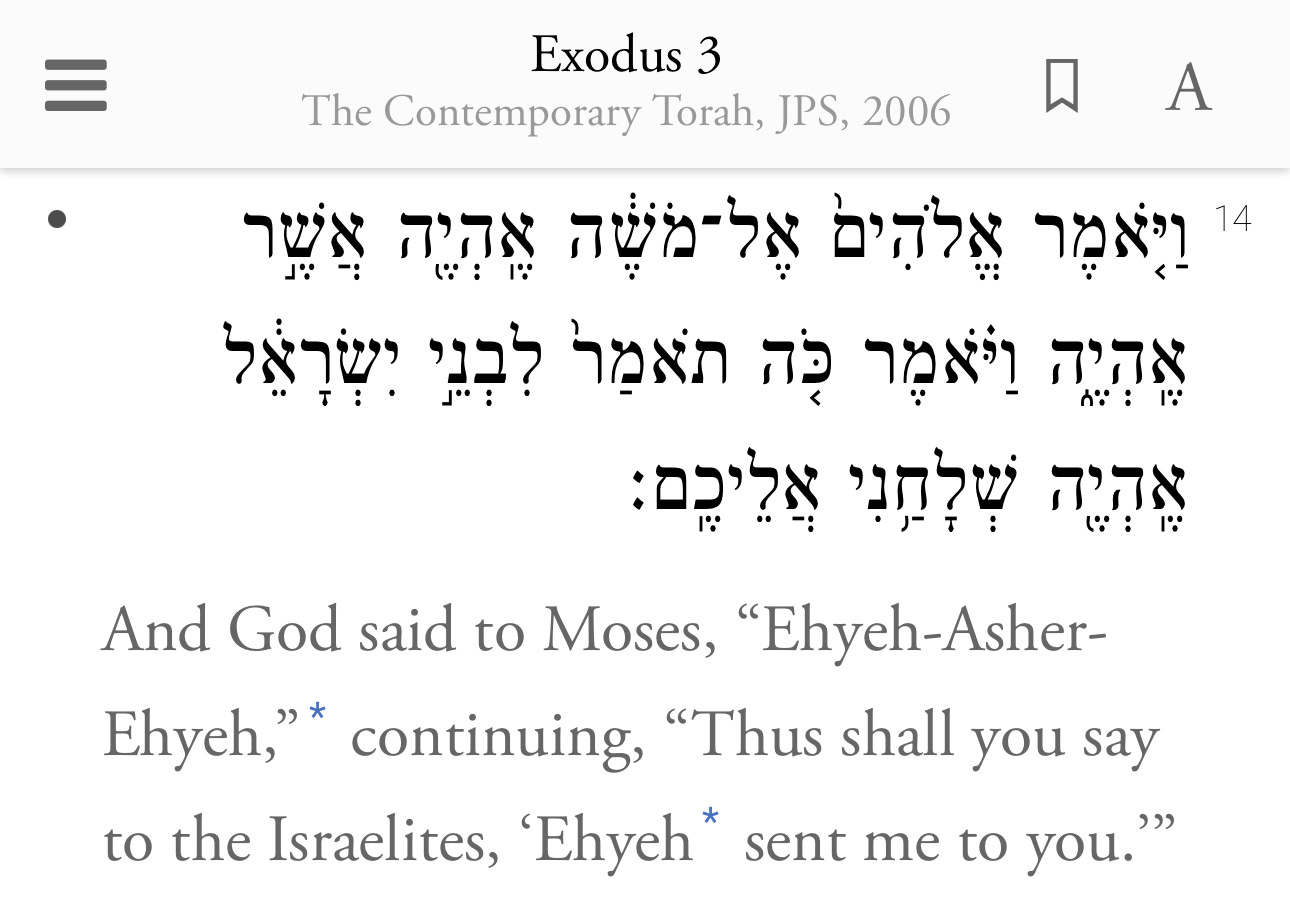
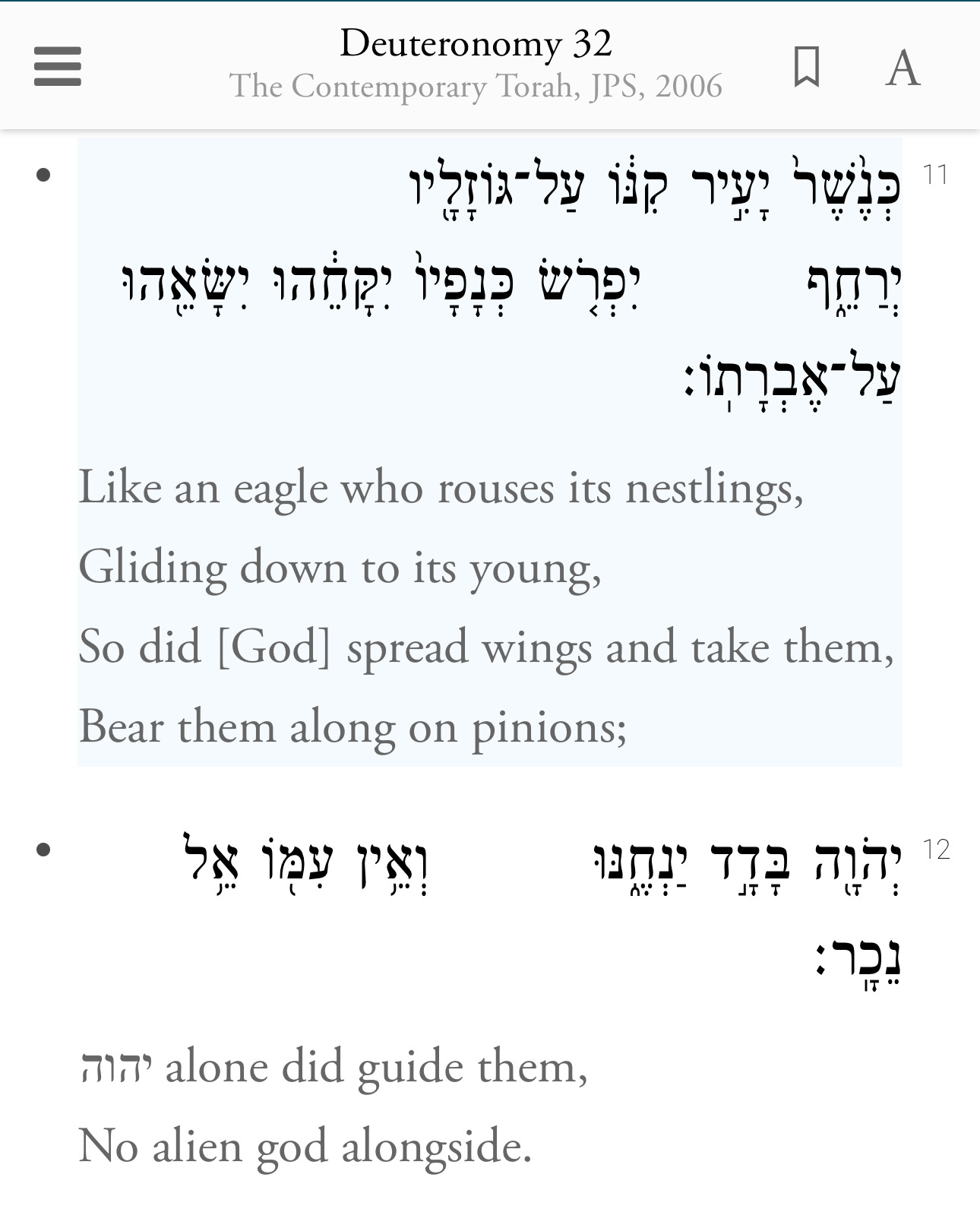
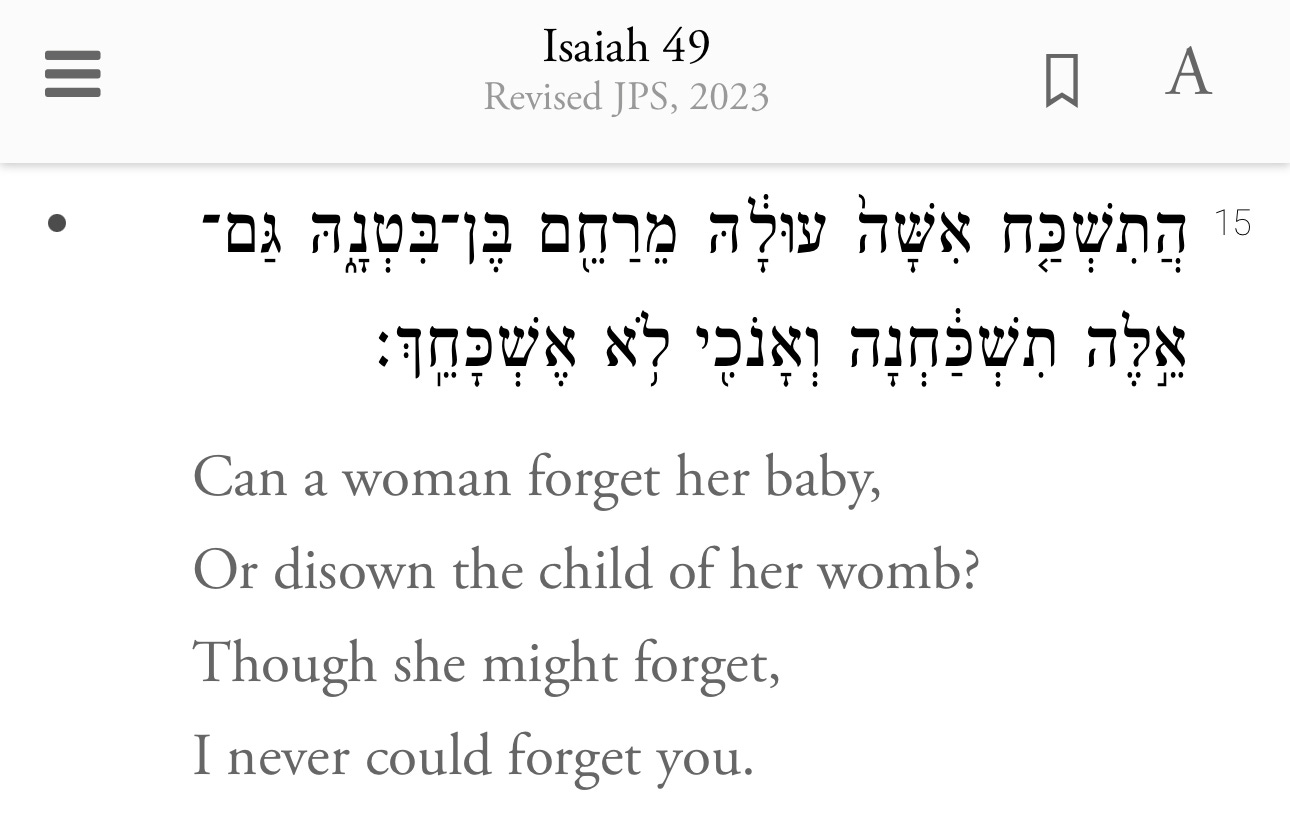

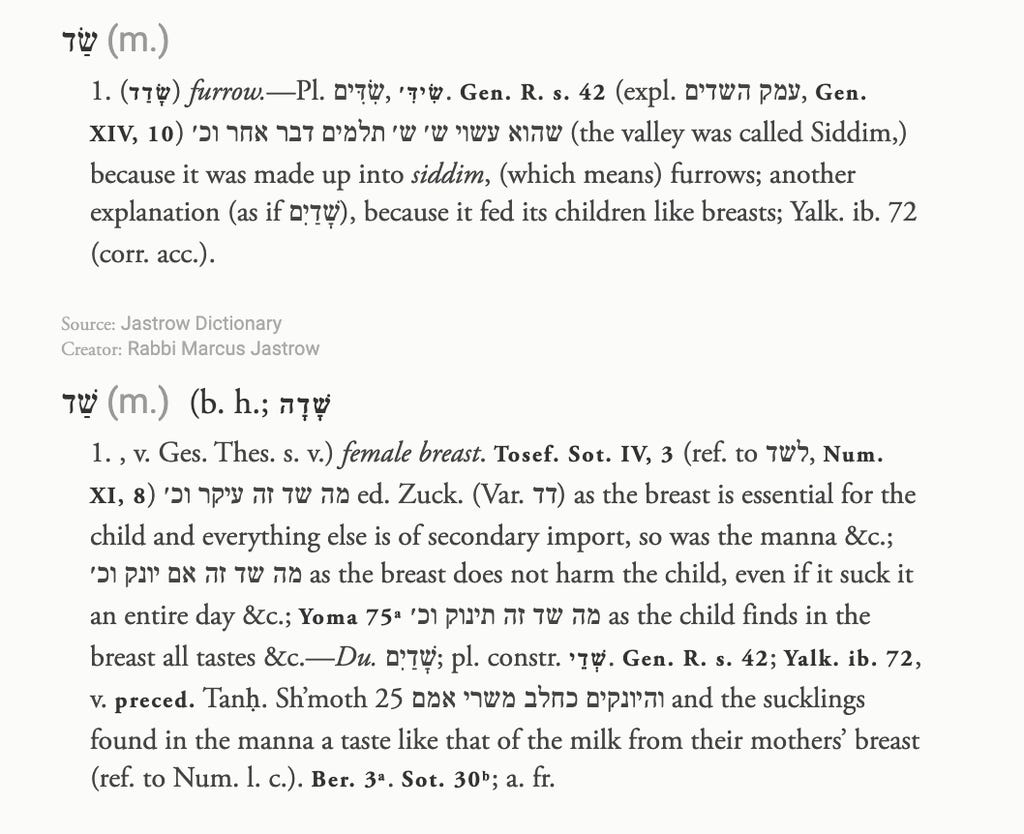
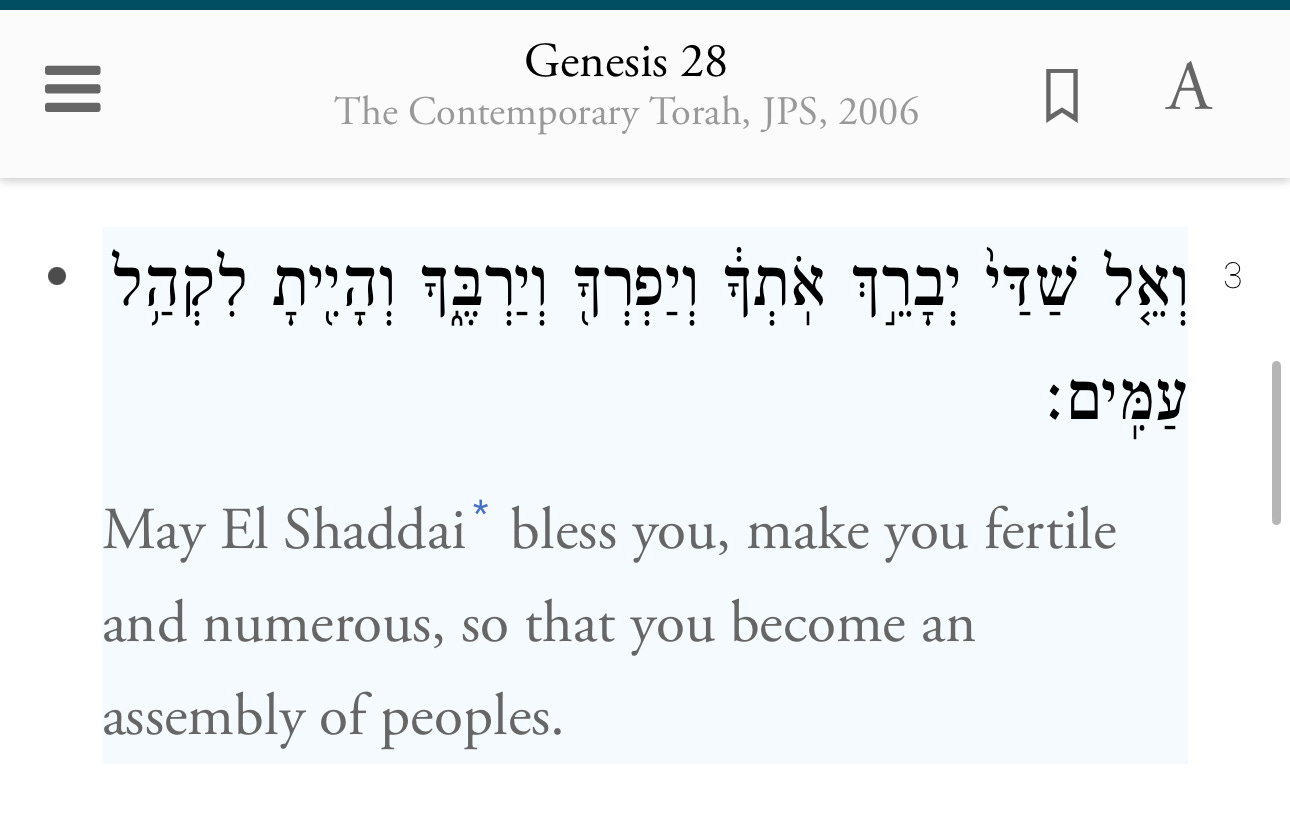
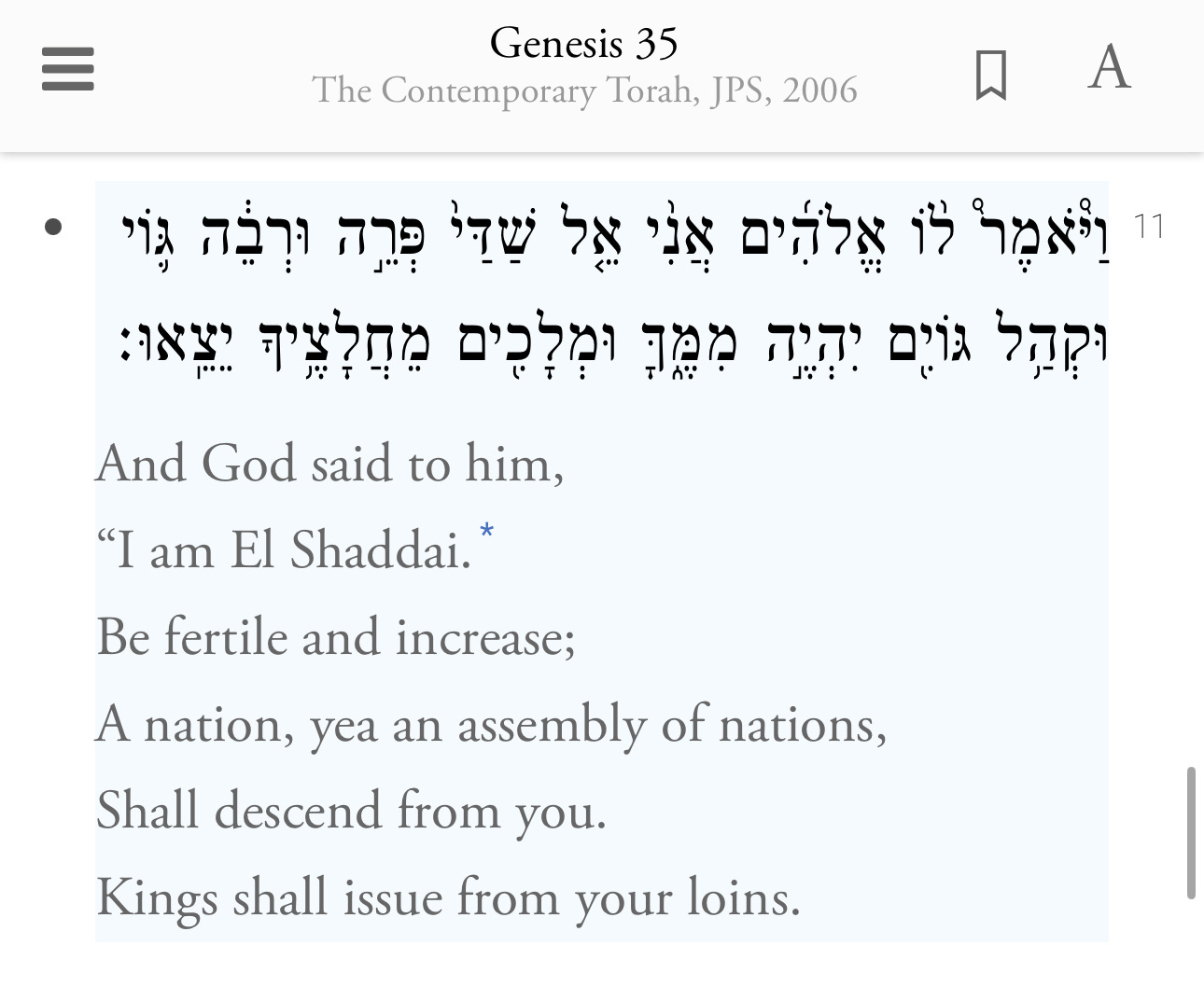
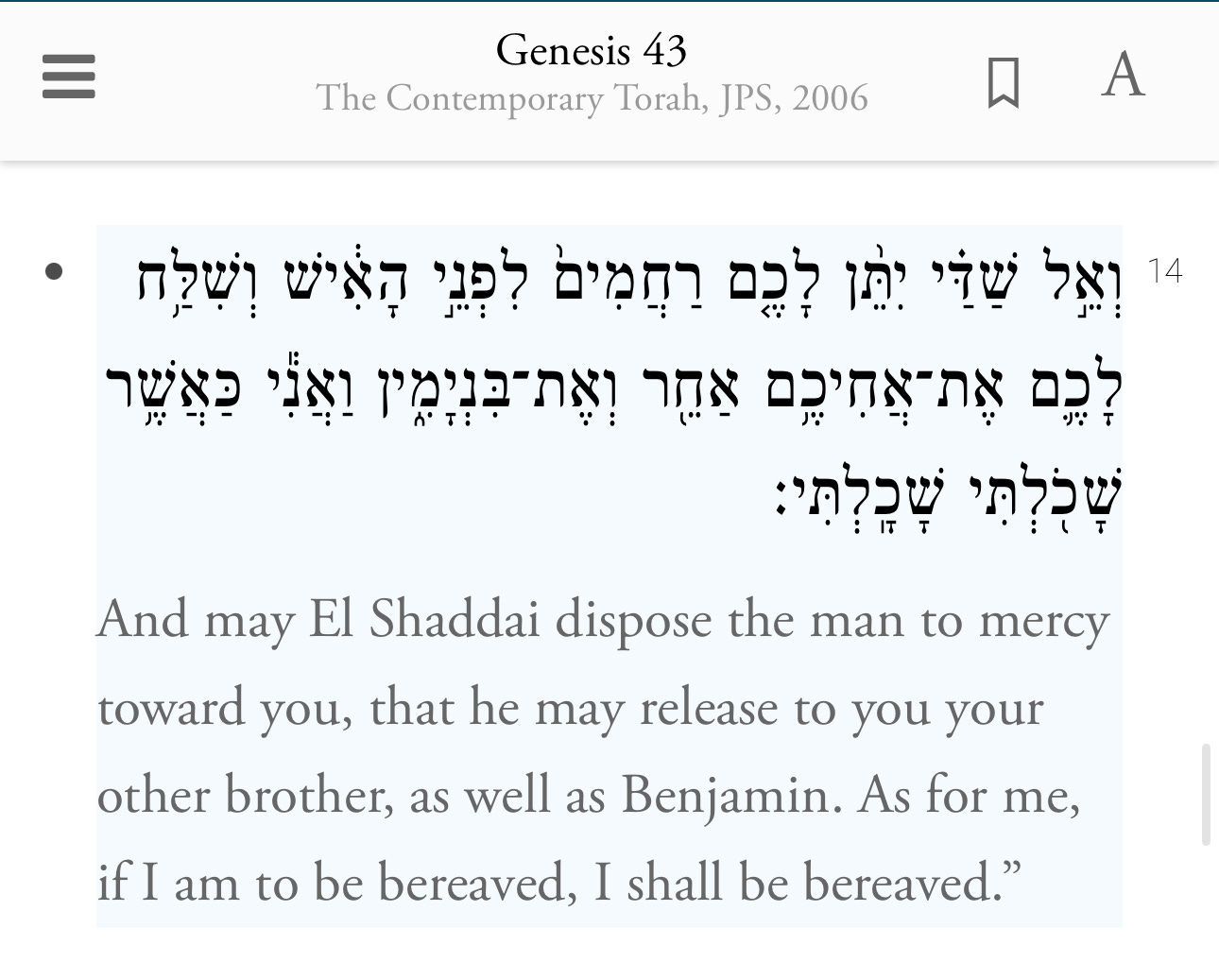
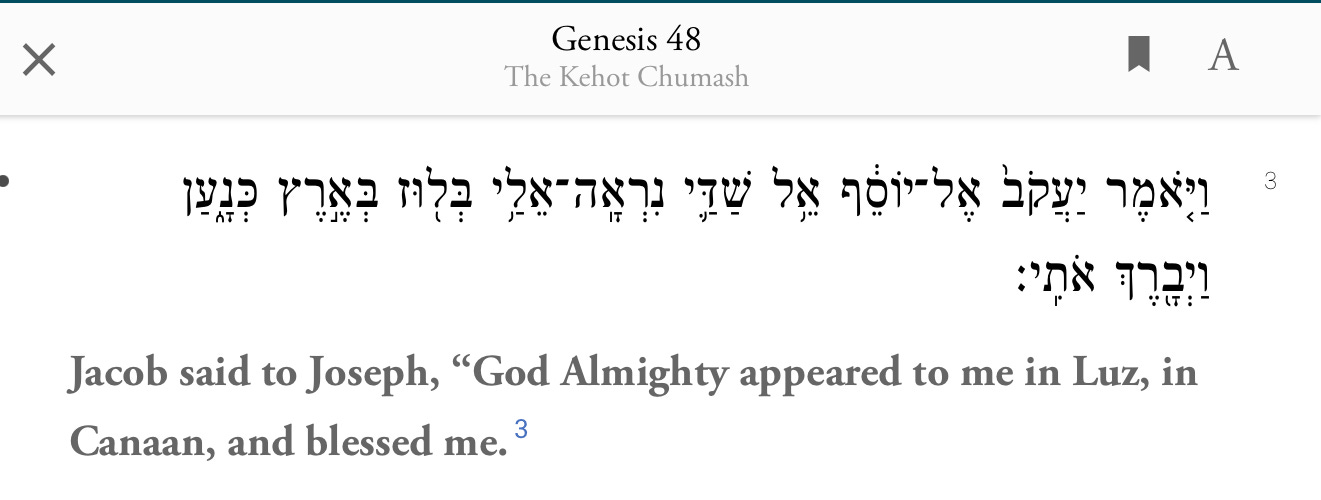
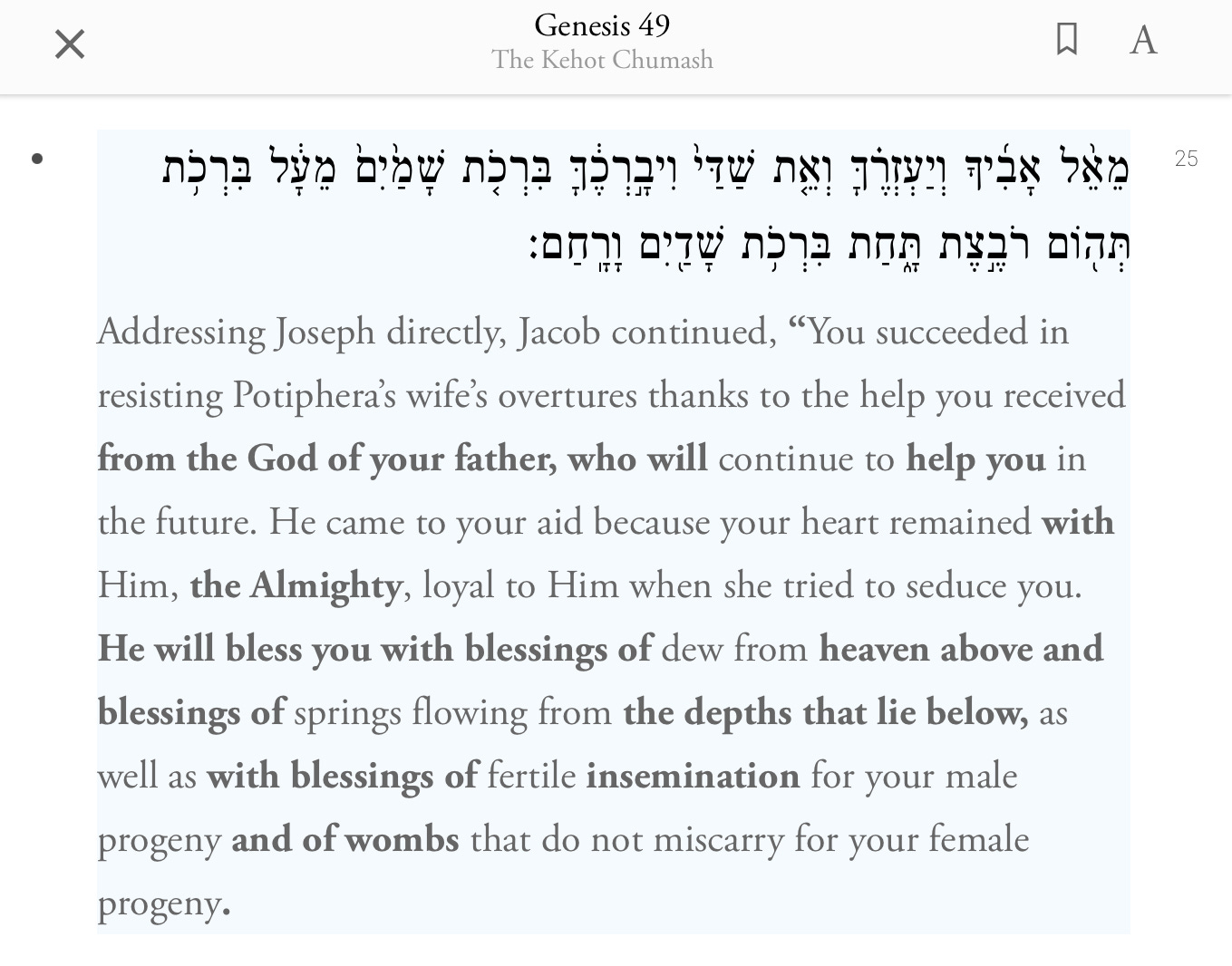
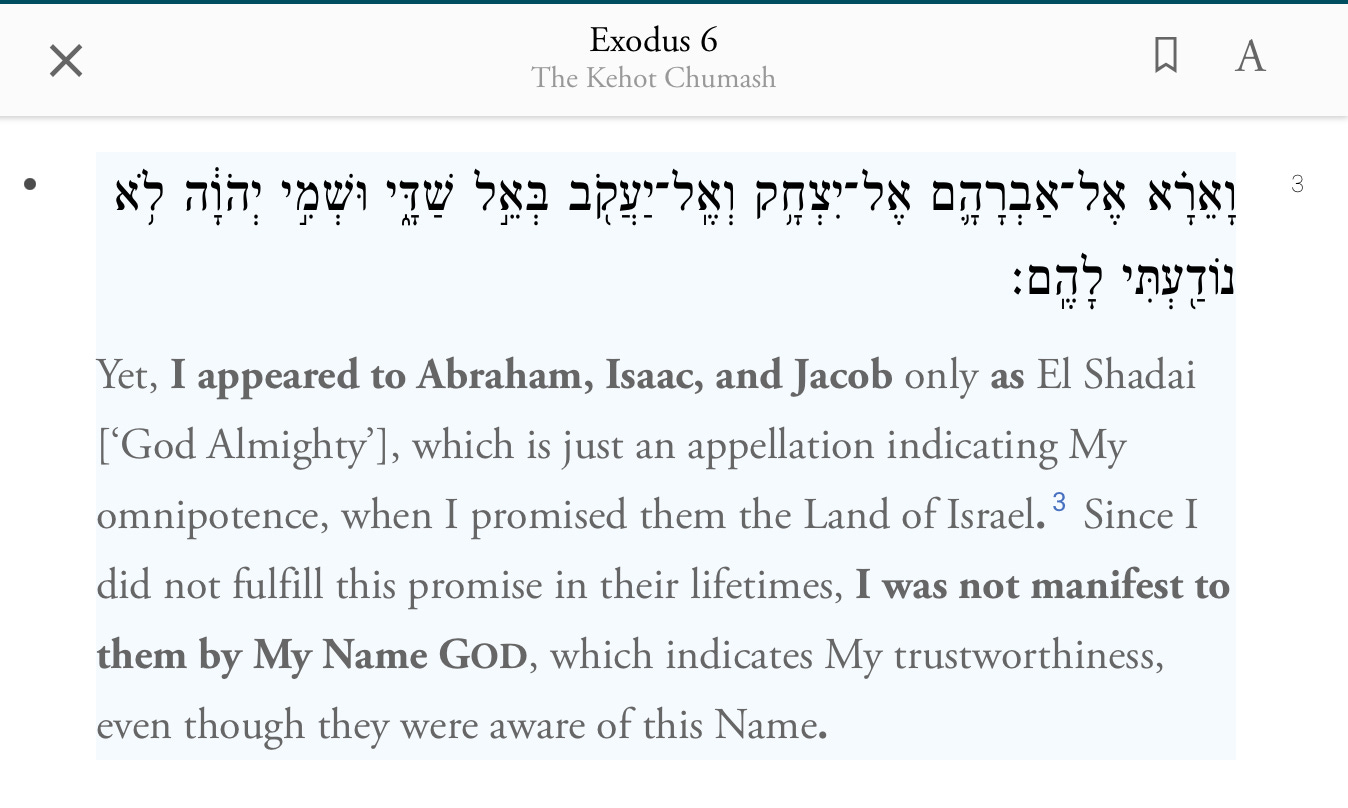
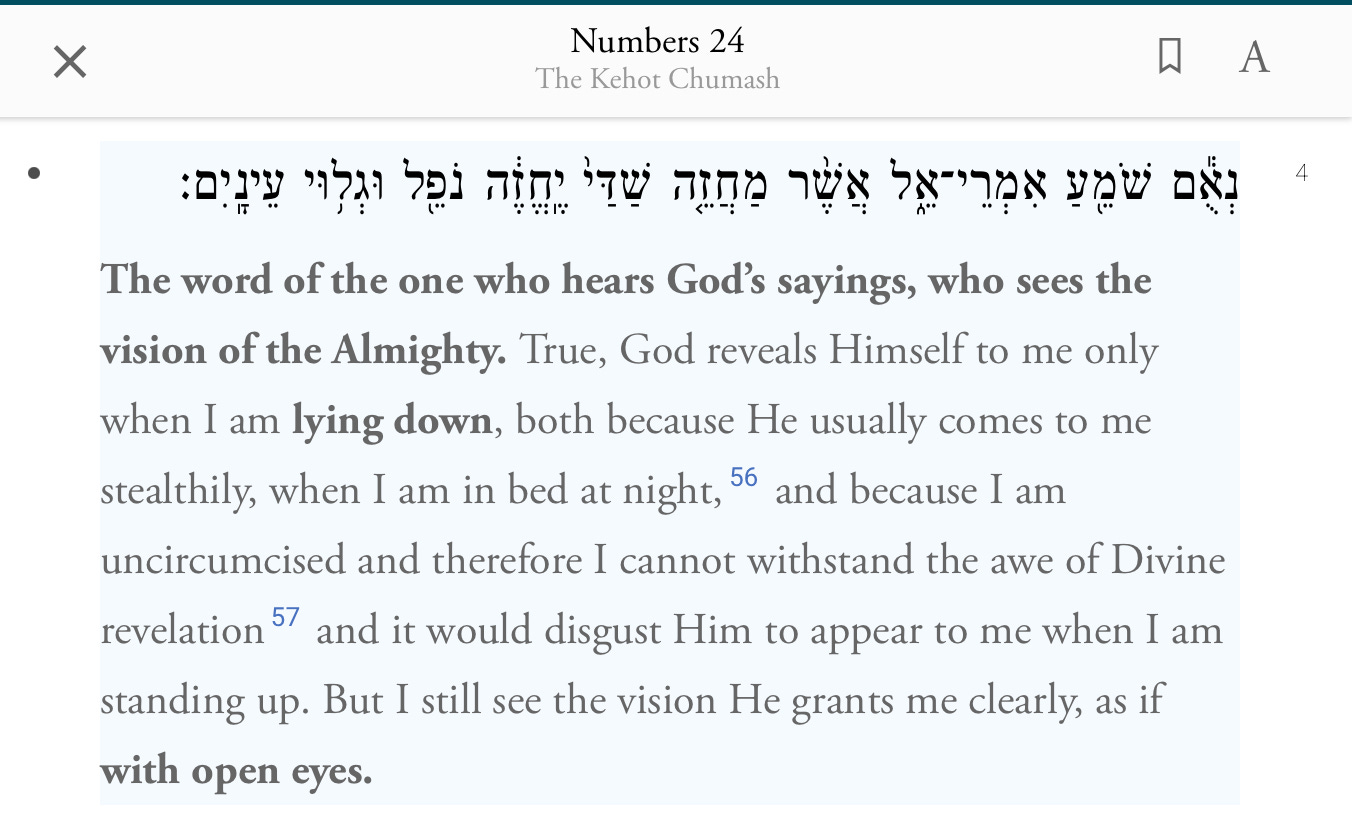
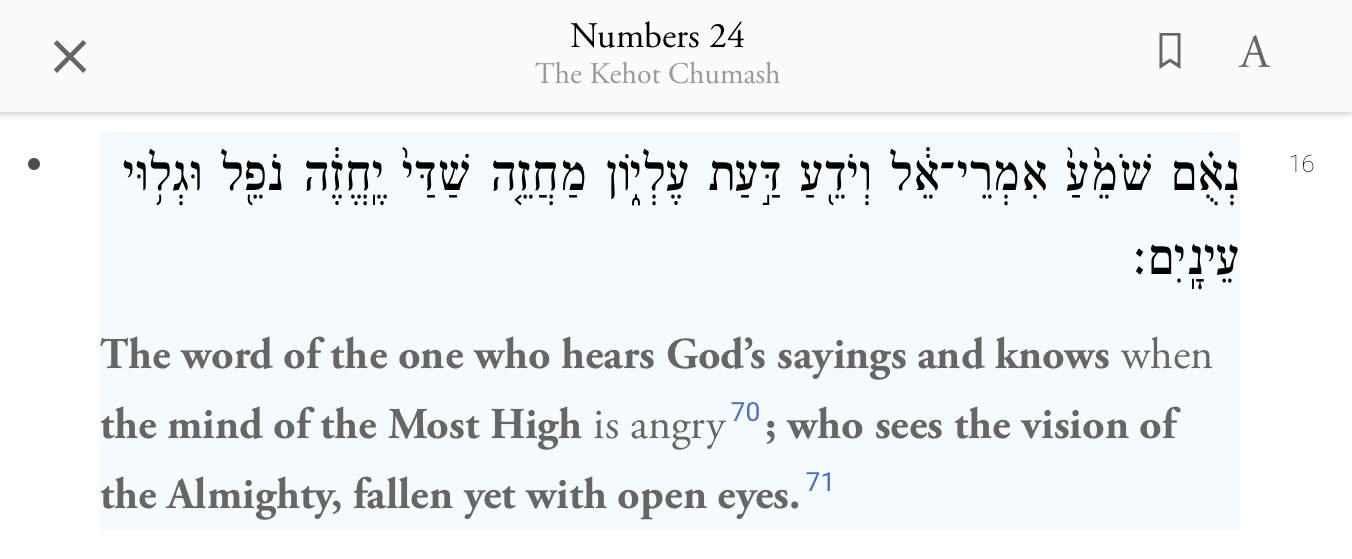
Possibly because at the time it was written men believed that they were the creative impulse because they also believed, that the man planted a human seed into the woman who was just a garden or a farm, in many cases that woman was not really fully human as many still do today.
This is confirmed at least in biblical study, as I have not read the Torah, with sentences such as not spilling the seed on barren ground and the also possibly the forbidding of homosexuality.
To be honest I find it difficult to accept that these writings came from God dimple because, agsin via the Bible, the bring did not understand or convey the true description of human reproduction.
For me it comes down to man sees woman put a seed in the ground, sometime later a plant pops up. Man thinks I am the giver of life she is just the dirt.